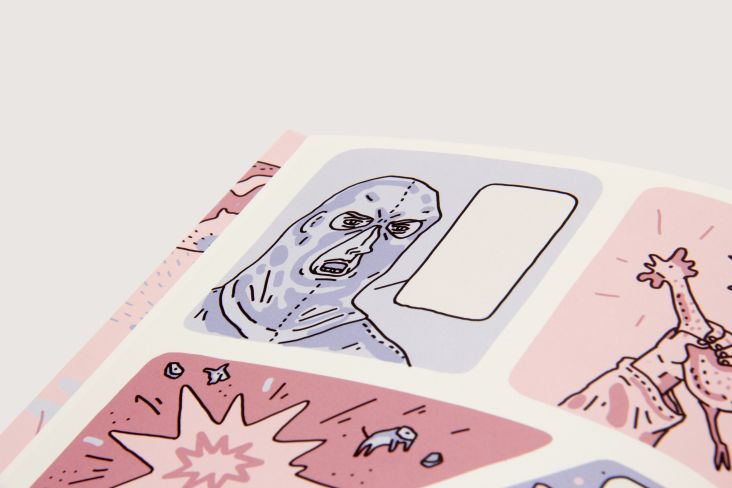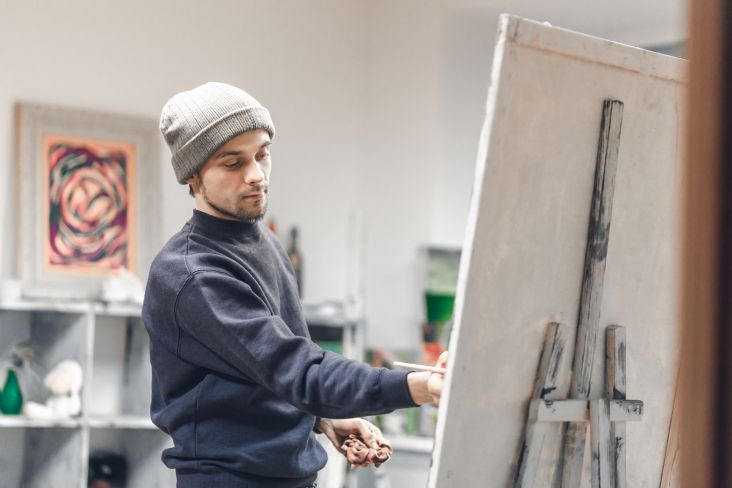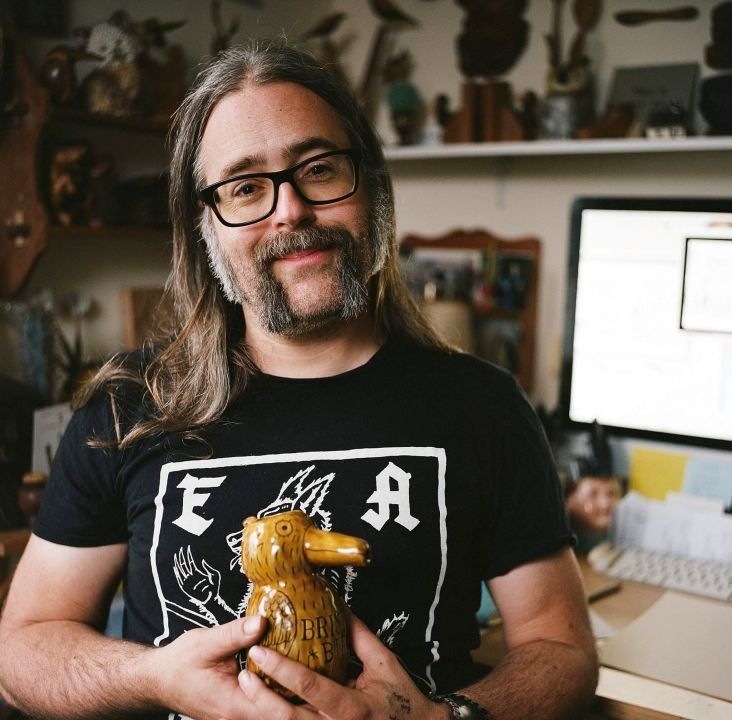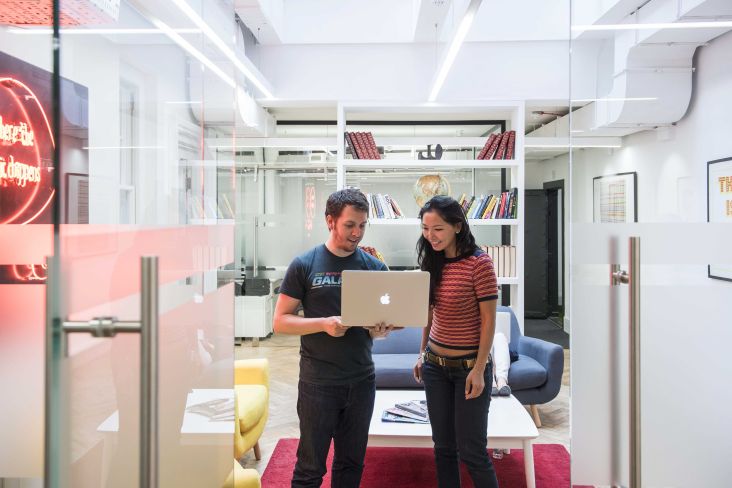Overwork isn't heroic: Tips from creatives on how to be a success without overdoing it
I’ve been talking to lots of friends in the creative community lately about the subject of overwork – how there seems to be a conversation, not just in Manchester, but all over the world, that you can’t be a success without burning the midnight oil.

Image licensed via Adobe Stock
People boast about it. Share pictures on Instagram of their laptops on their beds at weekends. It's like "overwork" has become a badge of honour. That success only comes from half killing yourself. And many of you are angry about it, for good reason.
However, this is where it gets confusing (and frustrating) for me. Because one common trait that I've seen in successful people during my 20-year career is that they have worked very hard to get where they are. Many successful people won't admit it, but they'll have made some sacrifices. They're driven, determined, ambitious – always thinking about the next big thing.
Did they ever suffer burnout? Push themselves too far? It's likely. But for many, they've since found balance. One can assume that those occasional "burnouts", a symptom of overwork, probably made them reassess things. Perhaps they were able to find that balance because hard work gave them an easier life, i.e. they were finally able to charge more for less time, hire outside help or their side project eventually paid off. Maybe some initial pains gave them lots of gains.
Of course, my evidence is purely anecdotal.
There are plenty of people out there who work incredibly hard and are very talented but haven’t yet found a way to stick to seven or eight hour days. They struggle because of the nature of their business or the all-consuming fear of work drying up. Like most, they have mortgages, families, responsibilities. They have to keep going. And that means weekends are sometimes lost.
How can we address this issue? Is it possible to be a success in the creative industries without overworking? Is it time we had a serious conversation about the importance of rest? What equates to "overwork" compared to a little healthy "hard work"? And if you enjoy working hard, does that count as doing too much?
What is "success" anyway? It means different things to different people. Success could mean earning more money, doing something that you love. It could be about getting enough savings to retire early and focus on more creative pursuits. For some, it's about being at the top of your game, reaching the top of the career ladder. While for others, you might want to work less.
I asked the creative community on Twitter for their thoughts on overwork, as well as any tips they might have to share.
Four hours of focus each day is all you need
Aside from all the admin tasks, how much brainwork should you aim to get done in one day? The answer is four hours.
That’s according to Alex Soojung-Kim Pang, author of Rest: Why You Get More Done When You Work Less who derives evidence from history's most creative figures. Charles Darwin, for instance, worked for two 90-minute periods each morning and an hour after lunch. That's when he'd declare that he'd “done a good day's work”. As Pang points out, on this schedule, he wrote 19 books, including his most famous – The Origin of Species.
To strengthen his argument, Pang looked at a survey of scientists' working lives, conducted in the early 1950s. Could it be possible that the more hours they worked, the more articles they published? No. That wasn't the case. Those who spent 25 hours in the workplace were no more productive than those who spent five.
The concept of working fewer hours is nothing new. Over 250 years ago, a chap called Adam Smith said: “The man who works so moderately as to be able to work constantly not only preserves his health the longest but, in the course of the year, executes the greatest quantity of work.”
We get it. Longer hours doesn't mean more work gets done. And working less might produce the best output. So why are we still overworking? And why are we also getting stressed at the thought that we should be working less?
Tackle the "high functioning anxiety" aspect
Are you always busy? High-achieving and something of a perfectionist? Do you always feel anxious? Like you're not doing enough? Are you perhaps making yourself busy for the sake of feeling, well, busy?
If you're a millennial, you're part of a generation that has been dubbed the most anxious to date. You go to work and lead a seemingly normal life, but you suffer in silence. You worry constantly. You may have "high-functioning anxiety".
Blame social media, constant connectivity, job insecurity, too much debt, the difficulty of homeownership, global issues and the pressure to lead the "most fabulous life ever", and you can see why many are suffering.
Healthline offers some excellent tips on how to tackle anxiety, starting with the necessity to recognise the symptoms. We've also written our own tips on dealing with anxiety.
Bottom line, if you're feeling anxious, don't panic. Recognise the symptoms and then take steps to reduce that anxiety. Avoid alcohol, get a good night's rest and move your body frequently. Enjoy time away from technology and screens. Embrace family life and see friends. It will all help.
Prioritise and set yourself realistic goals
You now know that four hours a day is all you need to dedicate to creativity. Perhaps an hour or two for all those admin tasks. How the hell do you get your work done in that time? Particularly when you're used to 12 hour days, seven days a week?
Creative coach Lola Hoad thinks it's about prioritising everything. "When you sit down at your desk first thing in the morning, ask yourself 'if I only have three hours to work today, what should I do?'. It helps you to carve out the unnecessary filler tasks and makes sure you're 100% focused on the tasks that are going to get you closer to your version of success."
It's great advice but not always easy to follow. Not when you're juggling multiple clients who want everything done yesterday. My advice? If possible, update your clients every Monday and tell them when you'll be focusing on their business. Don't be afraid to book time with each one, so you can dedicate your full attention to them.
This tactic doesn't always work. Things pop up and interrupt workflow. But most of the time, you'll find setting goals and deadlines with each client will help you focus and subsequently be far more productive than you ever were when you tried to do everything at once.
"'One thing at a time' will always perform a better day's work than doing two or three things at a time. By following this rule, one person will do more in a day than another does in a week," says author Alex Soojung-Kim Pang in his book Rest: Why You Get More Done When You Work Less.
Try the Pomodoro Technique (and other productivity tricks)
There are so many excellent productivity tools and techniques at our disposal, we have no excuse but to take advantage of them. One we love is the Pomodoro Technique, a time management method developed by Francesco Cirillo in the late 1980s.
It uses a timer to break down work into chunks, traditionally 25 minutes in length and separated by short breaks.
"Burnout is so common in our current age of always-on connectivity," says Laurie Wang, a creative digital marketing consultant. "I, for example, learned to switch off and use productivity tools to help me get more done, and avoid burnout by using the Pomodoro Technique. I would get more done in three sprints of 90 minutes than sometimes in two days of not using this!"
Use the free Tomato Timer to get started and try the technique for yourself. Decide on a task, set the timer, end work when the timer rings and put a tick on a piece of paper. If you have fewer than four ticks, take a quick break of around three minutes, then set the timer again. If you have more than four ticks, take a more extended break of between 15 and 30 minutes, reset your ticks to zero and start again, i.e. choose a task.
Accept that things might have to take a little longer
There is so much pressure in the creative industries to achieve our goals, tackle those deadlines and survive in a competitive environment; we feel like we never have enough time. It's probably why many of us work longer hours.
Manchester-based illustrator Emma Reynolds believes we have to dial things down a notch and accept that things can take time. "I've been working in my spare time for two years on a children's book, and it would frustrate me that I couldn't physically work every evening after work and one weekend day a week. I was too tired after my full-time creative job.
"I concluded that it was just going to take me longer to do what I wanted to do. I was going to have to nibble away at it until it was done. And it worked – it sometimes felt like it took forever, but I didn't work every evening and not every weekend which meant that I could still see my friends and relax and go for walks and enjoy life."
Sometimes, a little sacrifice can go a long way
I'm not advocating overwork. But I'd like to look at another point of view. That is, a theory that we sometimes have to put in a little extra to achieve a specific goal. The idea that hard work might be temporary – for example, when you go freelance if you switch careers or take a part-time course when you're working full-time.
"I used to work seven days a week for about a year and a half. I taught English classes in three different schools, I wrote content and did social media the rest of the time," says Teddy Todorova. "I worked irregular hours, like 6 to 9pm every day. Then my whole weekend was from 9am to 7pm. I only did it because I was saving money to move countries, from Bulgaria to the UK, and I did! It led to a change in career and now a full-time job in digital marketing for over 4.5 years. I'd say when the goal is worth it; I'd overwork and not regret a bit."
Duncan Brazzil agrees: "As a young designer, I believe that overworking is almost essential for success. A 9-5 job is not always enough time to learn or experiment with our practice, so I would almost argue that the hours after work can be vital in working towards 'success', especially within the creative industries."
Steven Poulton, meanwhile, thinks overwork is different for everyone. "I think 'overwork' can only be defined as when it becomes pathological for the individual. Some people can work more than others without losing their minds. It leads to a lot of 'you shouldn't work so much'. I think it's similar to the introvert/extrovert thing."
Another perspective comes from James Kirkup who thinks you have to choose your battles wisely: "Finding the balance of when it's worth it and when it's stupid comes with age both in and outside of a career. Learning how to work smarter, cut out pointless distractions and communicate with a team will all help, but enjoying life outside of work is key. Make plans, utilise your city or town, get a hobby. These tiny things will help you focus on work when it needs you while giving you a life to get you away from things when it's not needed."
Find balance and make time for lots of rest
"Hard work is important to get ahead, but alone, it does not equal success, especially if it's at the detriment of our health," says London-based business coach Simon Alexander Ong. "It's just as important to build in renewal periods to reflect, recharge and refresh. Because very often, we need to slow down to speed up."
This brings me back to author Alex Soojung-Kim Pang. In his book, Rest: Why You Get More Done When You Work Less, he says: "If you want to rest, you have to take it. You have to resist the lure of busyness, make time for rest, take it seriously, and protect it from a world that is intent on stealing it. History."
"For me, success used to be 'working full time as a freelancer', now it is 'having time to do what I enjoy', whether that be passion side projects or seeing friends," adds Emma Reynolds. "We're only here once. Sometimes you have to work your butt off to make a career shift, but for me, the ultimate goal is having a balance of work and play, otherwise what is the point? There is more to life than work, a lot more."
If you're still struggling, it's time to reassess
For this article, I can hold my hand up and admit that I'm no stranger to overwork or burnout. I'm not proud of this. But, for the most part, I've worked hard and had occasional silly moments when I've overdone it.
I believe without this experience; I wouldn't be where I am today. That is, running my own communications consultancy at a level that allows me to have the time for plenty of rest as well as the opportunity to work on my passion projects and side ventures.
Mine has been a personal journey. I graduated from university nearly 20 years ago. During half of that time, I've worked for myself and endured the highs and lows of running a business. It has been one of the most challenging things I've ever done. I've pushed myself to my limits. And I've learnt some valuable lessons – not just about business, but about who I am and where I want to be.
Hard work is something I've always enjoyed. But overwork, that's another matter entirely. That's not good for anyone. When things have become too tough, I've reassessed. I've changed jobs, gone freelance, built an agency and then downsized it again. I've started ideas and ditched them. Change has been good for me.
In which case, if I may share some wisdom, it's this – if something isn't working – if freelancing isn't for you or you hate your job, if "overwork" is too much of an issue, don't be afraid of change.
Equally, don't ever feel guilty about doing things your way. Set boundaries. If you enjoy a little hard work now and again, fine, only you will know when you have to endure a little sacrifice. Go with your gut and push yourself when necessary.
Whatever you do, remember to embrace time away from your desk – not just because you'll gain more from working less but because your long-term health and happiness depends upon it.

























